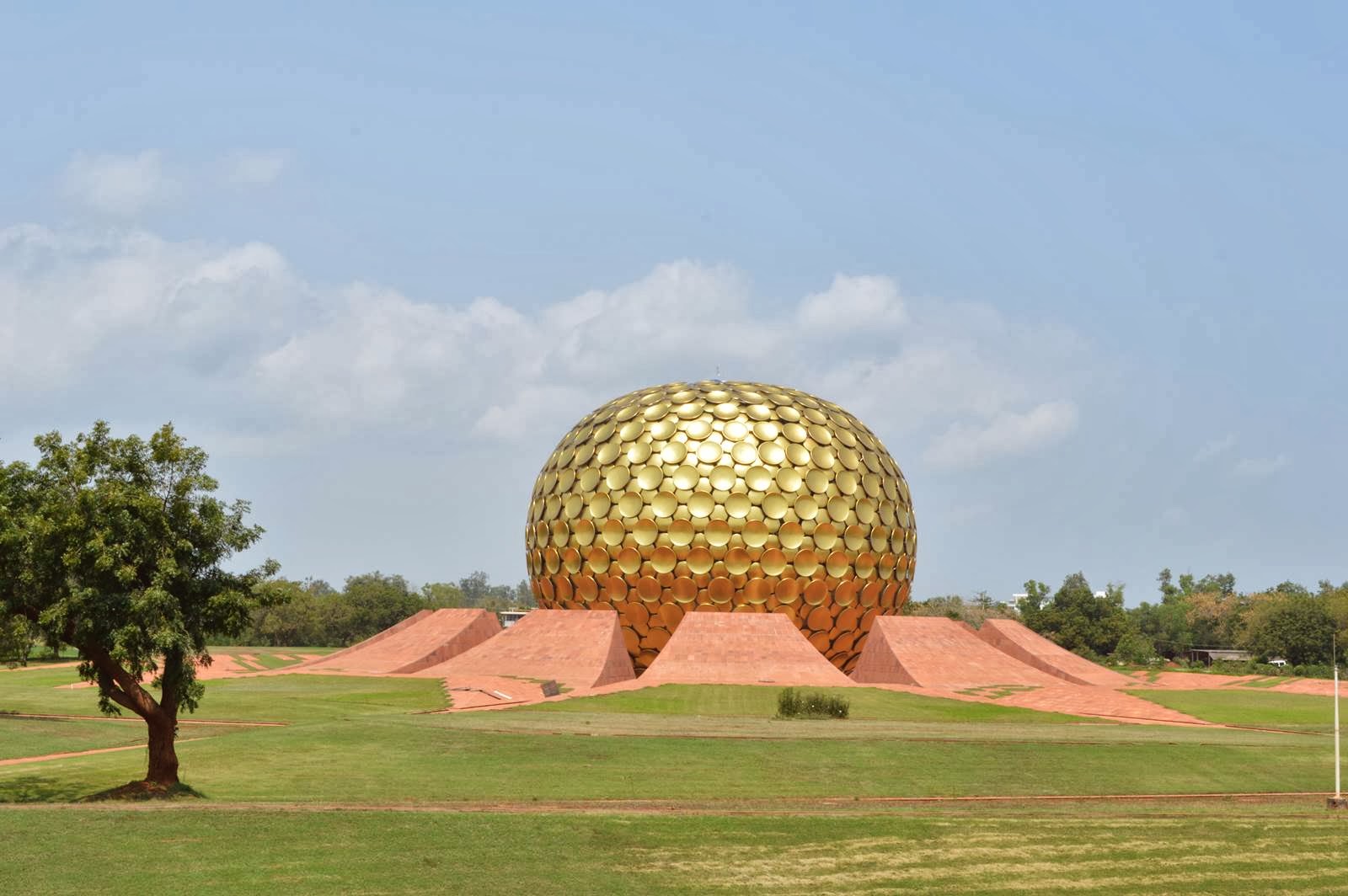Auroville es una ciudad experimental, creada según los principios de Mirra Alfassa (La Madre), discípula de Aurobindo. El motivo de la creación fue "un lugar de vida comunitaria internacional, donde hombres y mujeres aprendan a vivir en paz, armonía, más allá de todas las creencias, opiniones políticas y nacionalidades" y "Debe existir sobre la Tierra un lugar inalienable, un lugar que no pertenezca a ninguna nación, un sitio en donde todos los seres de buena voluntad, sinceros en sus aspiraciones, puedan vivir libremente como ciudadanos del mundo"
La ciudad fue inaugurada el 28 de febrero de 1968 en presencia del presidente de la India y representantes de otros 124 países; cada uno de ellos arrojó un puñado de tierra de su país de origen dentro de una urna que se encuentra enterrada en el centro de Auroville, simbolizando así la fraternidad universal.
En el centro de Auroville se encuentra el Matrimandir, lo que es considerado el núcleo, que es una sala de meditación. Después en forma radial están las pequeñas aldeas, las cooperativas, el bosque reforestado, huertos, jardines, albergues, zonas residenciales, culturales o la zona internacional.....en este insólito lugar y hermoso proyecto viven alrededor de 2000 personas, de unos 35 países diferentes.
 |
| 12 gardens |
 |
| Matrimandir |
 |
| the ''solitude' coop farm |
 |
| Auro Bindo center |
Auroville
is an experimental township 12km north to Ponicherry. The settlement
here started in 1968 and was 'meant to be a universal town where men
and women of all countries are able to live in peace and progressive
harmony, above all creeds, all politics and all nationalities. The
purpose of Auroville is to realize human unity." This was the
idea of it's founder- Mirra Alfassa.
The
story of the idea beind the Auroville project goes back to the
meeting between Mirra (called The Mother) and her spiritual guide Sri
Aurobindo. Their aspiration was to make an utopian place, where
everything is to be shared and private property or religions do not
exist.
"Auroville
belongs to nobody in particular. Auroville belongs to humanity as a
whole. But to live in Auroville, one must be the willing servitor of
the Divine Consciousness.

Auroville
will be the place of an unending education, of constant progress,
and a youth that never ages.
Auroville
wants to be the bridge between the past and the future. Taking
advantage of all discoveries from without and from within, Auroville
will boldly spring towards future realisations.
Auroville
will be a site of material and spiritual researches for a living
embodiment of an actual Human Unity."
In
the center of the township there is the Matrimandir building which is
the place for contemplation and only persons with special admittance.
The city is governed by a foundation and is controlled by the Indian
Government.
''Politics
and religion are not supposed to be in Auroville. It is the
Foundation, not the inhabitants, which owns the houses''
We
visited both the official, "touristic" part of Auroville,
we saw Matrimandir and then on another day we rented a motobike and
made a trip on our own and tried to get lost in Auroville, we visited
some coop farms and took a few looks on the residental part of the
township.
Szorcik:
Auroville to experymentalne miasto powstałe pod koniec lat 70-tych
ubiegłego wieku. Pomysłodawcą była Mirra Alfassa oraz jej duchowy
przewodnik Sri Aurobindo od którego to imienia pochodzi nazwa
miasta. Miasto jest rządzone przez fundację zależną od rządu
Indii. Jest to miejsce, gdzie zakazane są religie, polityka oraz
własność prywatna. Wszystkie dobra są wspólne. Mieszka tu ponad
dwa tysiące osób z ok 50 różnych nacji. Większść mieszkańców
pracuje w różnorakich kooperatywach, przede wszystkim z żywnością
ekologiczną. Są tu szkoły, przedszkola, szpitale... na pozór
wszystko funkcjonuje jak w zwyczajnym miasteczku... ale tak naprawdę
to miejsce naprawdę specjalne, które udowadnia, że życie w
zgodzie i bez własności nie jest tylko utopią.


















No hay comentarios:
Publicar un comentario